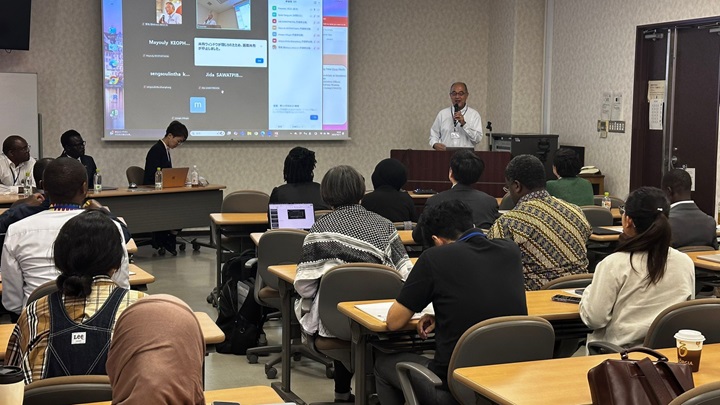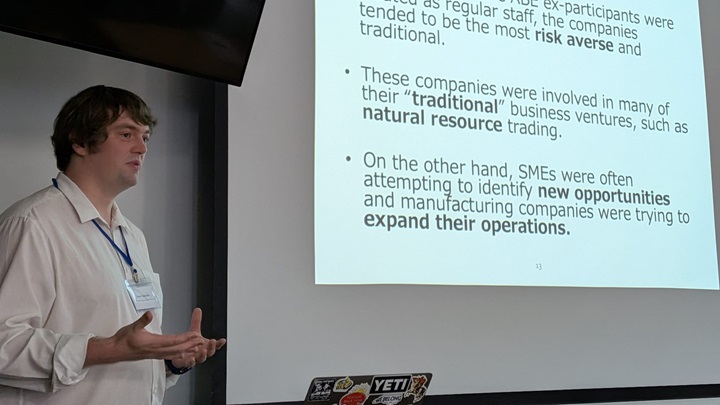Asia-Africa Partnerships in the Global Paradigm Shift: Insights From the Annual Conference of the Japan Society for Afrasian Studies (JSAS) at Hiroshima University
2025.11.05
On Oct. 11, 2025, the annual conference of the Japan Society for Afrasian Studies (JSAS) was held at Hiroshima University. This year’s theme, “Enhancing Asia-Africa Partnerships in the Global Paradigm Shift”, highlighted the growing importance of cross-regional collaboration between Africa and Asia in response to the evolving geopolitical and economic transformations in the rest of the world.
The event brought together scholars in African studies and development practitioners to enhance Asia-Africa partnerships. Among the contributors was Executive Director Mine Yoichi of the JICA Ogata Sadako Research Institute for Peace and Development (JICA Ogata Research Institute), a proponent of the concept of “Afrasia”—a regional framework linking Africa and Asia—who participated in the panel discussion. Research Fellow Kaizuka James of the institute also contributed to the conference by presenting a paper.
The conference began with a panel discussion titled “Peace and Conflict in Afrasia: Seventy Years after the Bandung Conference,” which explored the historical and contemporary dimensions of Asia-Africa cooperation.
First, Jean-Claude Maswana from Ritsumeikan University reviewed economic cooperation between Asia and Africa since 1955. He traced how the conference’s principles of decolonization, peace, and mutual economic progress evolved into four major cooperation frameworks: Japan’s TICAD, the Tokyo International Conference on African Development (1993); China’s FOCAC, the Forum on China-Africa Cooperation (2000); India’s IAFS, the India–Africa Forum Summit (2008); and Indonesia’s IAF, the Indonesia-Africa Forum (2018). Although trade between Asia and Africa has significantly expanded since then, structural imbalances have persisted. He noted that network and econometric analyses reveal China’s dominant influence and enduring asymmetry, leading him to call for a renewed “Bandung 2.0.”
Second, Peter Okello of Hiroshima University examined how Asian countries—Japan, India, and China—have contributed to peacebuilding in South Sudan. He outlined South Sudan’s ongoing crises, such as civil conflict, displacement, famine, and economic collapse, and showed how Asian engagement reflects Bandung’s principles of cooperation and solidarity. The initiatives taken by these Asian countries demonstrate their evolving roles in Africa amid persistent structural and political challenges.
In response to these presentations, Director Mine emphasized the importance of integrating the development and peace agendas and highlighted the fact that that even a small gathering connecting Africa and Asia can have the power to change the world order in the future, while expressing appreciation for the presence of the JICA scholars. He also pointed out the potential for Asian countries to coordinate their activities in response to African initiatives.

Mine Yoichi, Executive Director of the JICA Ogata Research Institute
Building on the discussions around peacebuilding and regional cooperation, the conference also addressed the role of education and business in strengthening Asia-Africa ties. In his presentation, Kaizuka examined different interpretations of Japanese businesses towards the idea of “acclimatization with Japanese business practices” within the context of the ABE Initiative (officially titled the “Master's Degree and Internship Program of African Business Education Initiative for Youth” scholarship program), and whether these interpretations work for the mutual benefit of Japan and Africa. Kaizuka argued that the most successful interpretations are those where ABE scholars can act as “cultural translators” or “path-seekers”, either bringing and localizing Japanese business practices for the local labor force or identifying business opportunities for interested Japanese companies. Kaizuka emphasized through this the importance of allowing ABE scholars to make the most of their unique skills and position as people who are highly knowledgeable about both Japan and their home countries. His presentation was followed by a panel discussion with Christian Otchia and Sakamoto Ryuichi, both of Nagoya University, on how Japan can practically drive business in Africa, with views exchanged on the need for greater Africa-Japan cultural exchange and the promotion of understanding of business conditions in Africa to overcome stereotypes that hold back investment.

Kaizuka James, Research Fellow at the JICA Ogata Research Institute
For an overview of the project mentioned in the presentation, please click the related link below.

事業事前評価表(地球規模課題対応国際科学技術協力(SATREPS)).国際協力機構 地球環境部 . 防災第一チーム. 1.案件名.国 名: フィリピン共和国.

事業事前評価表(地球規模課題対応国際科学技術協力(SATREPS)).国際協力機構 地球環境部 . 防災第一チーム. 1.案件名.国 名: フィリピン共和国.

事業事前評価表(地球規模課題対応国際科学技術協力(SATREPS)).国際協力機構 地球環境部 . 防災第一チーム. 1.案件名.国 名: フィリピン共和国.

事業事前評価表(地球規模課題対応国際科学技術協力(SATREPS)).国際協力機構 地球環境部 . 防災第一チーム. 1.案件名.国 名: フィリピン共和国.

事業事前評価表(地球規模課題対応国際科学技術協力(SATREPS)).国際協力機構 地球環境部 . 防災第一チーム. 1.案件名.国 名: フィリピン共和国.
scroll